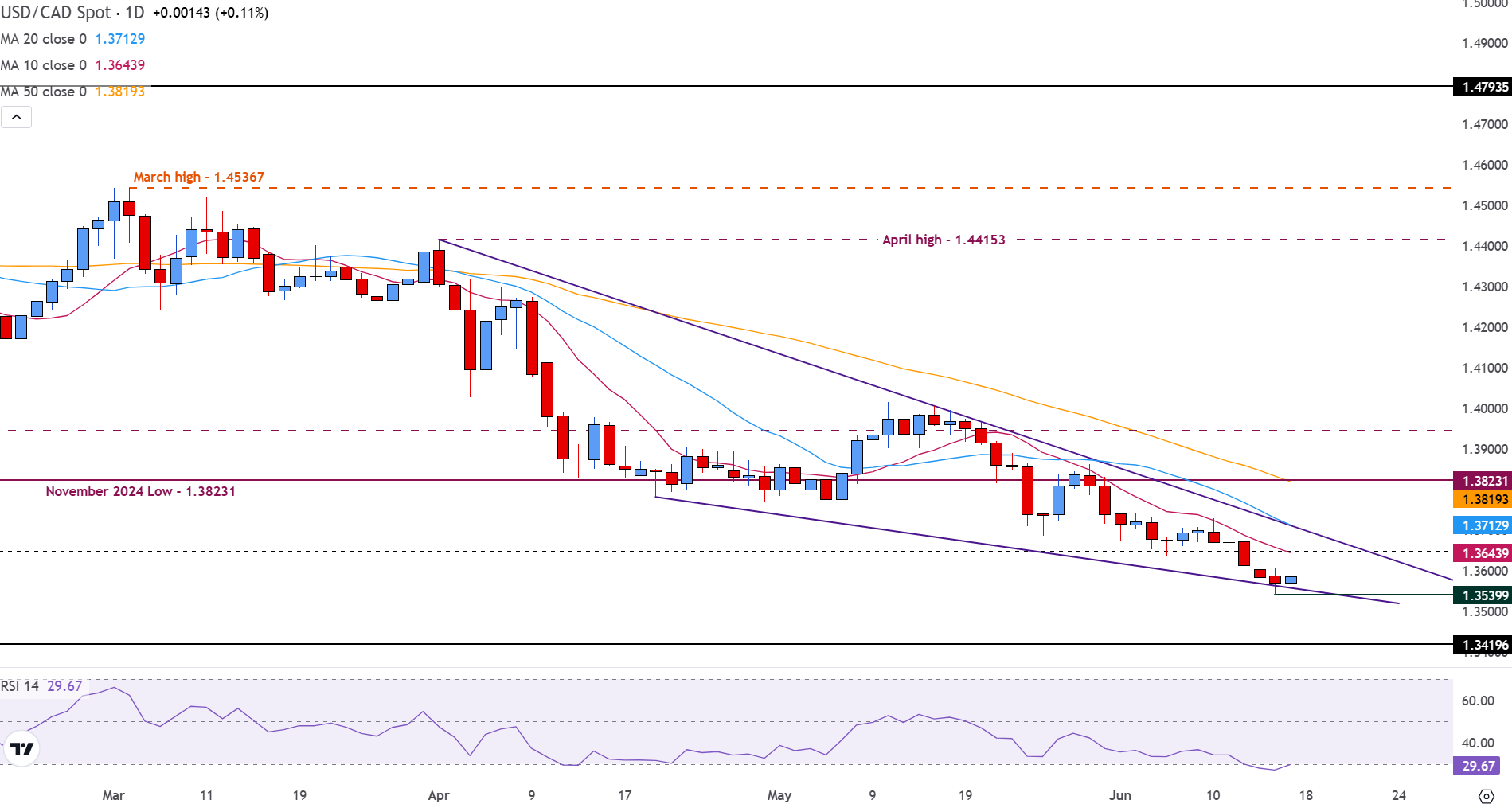- USD/CAD trades close to 1.3575 as markets digest a combined US Retail Gross sales forward of Wednesday’s Fed charge determination.
- Elevated Oil costs and geopolitical dangers within the Center East restrict losses for the Canadian Greenback.
- USD/CAD stays in a descending wedge, whereas the Relative Energy Index indicators a pause in bearish momentum.
The Canadian Greenback (CAD) is holding its floor towards the US Greenback (USD) on Tuesday, with USD/CAD shifting sideways close to 1.3575.
Blended indicators from the most recent US Retail Gross sales knowledge and escalating tensions within the Center East on Tuesday proceed to maintain merchants cautious because the Federal Reserve’s (Fed) coverage assembly looms.
The pair is struggling to seek out path after falling to an eight-month low on Monday, with markets shifting their focus towards the upcoming Federal Open Market Committee (FOMC) determination and any new headlines rising from the Persian Gulf.
Whereas Oil costs stay elevated, supporting the CAD by way of its commodity hyperlink, latest US knowledge and financial coverage indicators keep entrance and middle.
Retail Gross sales present combined indicators on Client Spending developments
The discharge of US Retail Gross sales on Tuesday has supplied a combined image. Headline figures declined by 0.9% in Might, lacking market expectations of a 0.7% decline and marking the steepest drop since early 2024. Gross sales excluding autos additionally fell by 0.3%, pointing to broad-based softness in shopper exercise.
Nevertheless, the management group, which strips out risky classes and feeds instantly into the calculation of Gross Home Product (GDP), rose by 0.4%, indicating a powerful rebound from April’s -0.1% and an indication that core consumption stays resilient.
For the Federal Reserve, the report presents a combined image. A decline within the headline quantity strengthens the case for maintaining charges regular and probably easing later within the yr. Nevertheless, the agency management group means that the financial system remains to be resilient, lowering the urgency for charge cuts.
From a broader perspective, the Israel-Iran battle is intensifying, threatening the safety of the Strait of Hormuz—a important chokepoint for world Oil provide.
For the reason that CAD is a commodity-linked foreign money, elevated Oil costs could assist restrict the draw back for the Loonie.
Within the close to time period, merchants will carefully monitor Oil value fluctuations tied to Center East developments and parse indicators from the Ate up Wednesday. These intersecting forces are prone to form the trail of USD/CAD into the latter half of the week.
USD/CAD technical ranges
USD/CAD stays underneath sustained promoting strain, buying and selling close to 1.3580 and holding simply above key trendline assist.
Costs have continued to respect the boundaries of a descending channel, with the 10-day (1.3644), 20-day (1.3713), and 50-day (1.3819) Easy Transferring Averages (SMA) sitting above the present stage.
The pair briefly examined the decrease sure of the channel close to 1.3540, however has but to decisively break beneath it.
An in depth beneath this stage may open the door towards the November 2024 low of 1.3419. In the meantime, the Relative Energy Index (RSI) hovers at 29 and is pointing larger, indicating that bullish momentum could also be shedding steam.
If the US Greenback strengthens, this might threat a short-term consolidation or a technical rebound towards resistance at 1.3640–1.3710 within the close to time period.
USD/CAD day by day chart

US Greenback FAQs
The US Greenback (USD) is the official foreign money of the USA of America, and the ‘de facto’ foreign money of a big variety of different nations the place it’s present in circulation alongside native notes. It’s the most closely traded foreign money on the earth, accounting for over 88% of all world overseas alternate turnover, or a median of $6.6 trillion in transactions per day, based on knowledge from 2022.
Following the second world warfare, the USD took over from the British Pound because the world’s reserve foreign money. For many of its historical past, the US Greenback was backed by Gold, till the Bretton Woods Settlement in 1971 when the Gold Commonplace went away.
A very powerful single issue impacting on the worth of the US Greenback is financial coverage, which is formed by the Federal Reserve (Fed). The Fed has two mandates: to realize value stability (management inflation) and foster full employment. Its main software to realize these two targets is by adjusting rates of interest.
When costs are rising too rapidly and inflation is above the Fed’s 2% goal, the Fed will increase charges, which helps the USD worth. When inflation falls beneath 2% or the Unemployment Price is just too excessive, the Fed could decrease rates of interest, which weighs on the Buck.
In excessive conditions, the Federal Reserve may also print extra {Dollars} and enact quantitative easing (QE). QE is the method by which the Fed considerably will increase the move of credit score in a caught monetary system.
It’s a non-standard coverage measure used when credit score has dried up as a result of banks won’t lend to one another (out of the worry of counterparty default). It’s a final resort when merely decreasing rates of interest is unlikely to realize the mandatory end result. It was the Fed’s weapon of option to fight the credit score crunch that occurred through the Nice Monetary Disaster in 2008. It entails the Fed printing extra {Dollars} and utilizing them to purchase US authorities bonds predominantly from monetary establishments. QE often results in a weaker US Greenback.
Quantitative tightening (QT) is the reverse course of whereby the Federal Reserve stops shopping for bonds from monetary establishments and doesn’t reinvest the principal from the bonds it holds maturing in new purchases. It’s often optimistic for the US Greenback.



























